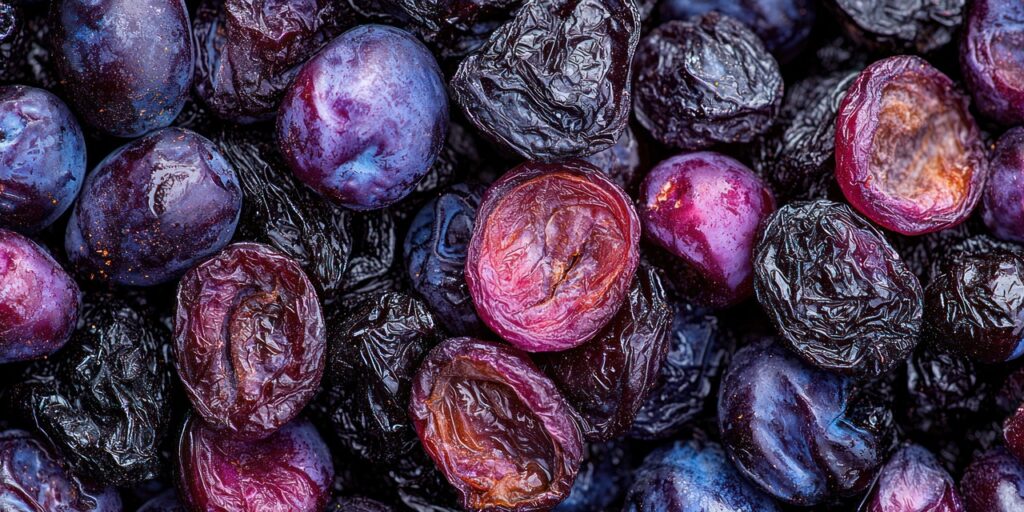Plain as they look on the outside, prunes may have a secret superpower: They’re often touted as a natural constipation remedy thanks to their supposed laxative properties. Whole, sliced, or turned into juice, these dried plums are purported to help you poop—and that’s no small thing, as anyone who’s struggled to go on the regular can attest to, Amy Burkhart, MD, RD, a physician and registered dietitian who specializes in gut health, tells SELF. Depending on the severity of the case, constipation can cause bloating, discomfort, and even all-out pain—not exactly a recipe for a fun time.
But not all traditional home remedies actually work. So when it comes to prunes, is there any legit science to the persistent belief that they can help you drop a big one when all other methods fail? And if so, how many prunes a day should you eat for best results? Should you shovel down handfuls or is this a case where more does not always equal better? We pruned (sorry) the available scientific literature and consulted GI experts to find out.
How do prunes affect your gut, anyway?
Turns out, everything you’ve been told is true: Prunes really do help flush out your GI system, Lisa Ganjhu, DO, a gastroenterologist at NYU Langone Health, tells SELF. Because of their very makeup, prunes “stimulate your bowels,” she says. (Read: get things moving). In fact, research suggests that they’re even more effective than the well-known fiber supplement psyllium at, ahem, spurring an evacuation. How? It all comes down to three specific characteristics that not all fruits have, Dr. Burkhart explains. Let’s dig into each in a little more detail.
Fiber
Often, people develop constipation because they’re not eating enough fiber, so it’s no real surprise that elevating your intake of that specific kind of carb can help treat the issue. And prunes really deliver in that regard. “[They’re] packed with fiber,” Dr. Ganjhu says. For instance, just one quarter cup of prunes contains around three grams, according to the USDA. This is important for toilet time, since fiber can help soften and bulk up your stool, speeding up its progress through your digestive tract.
Sorbitol
Fiber-packed as prunes are, that isn’t “the only reason that they are good for treating constipation,” Dr. Burkhart says. Sorbitol—a sugar alcohol that is commonly added to candy and chewing gum to enhance their flavor and is also naturally found in some fruits and vegetables—is another. Besides imbuing prunes with their characteristic sweetness, sorbitol draws water into the digestive tract to give a natural laxative effect, which also “helps with making the stool softer and easier to pass,” Dr. Burkhart explains.
Phenols
Compared to most other types of fruit, prunes are especially rich in phenolic compounds—antioxidants that may enhance the laxative effects of fiber and sorbitol.
What’s more, all three of these components—fiber, sorbitol, and phenols—may also help fight constipation by boosting your gut health (for example, enhancing the bacterial diversity in your gut). When they are broken down in your body, that process generates beneficial compounds known as short-chain fatty acids. This can “help balance the microbiome, which also then lowers your risk of constipation,” Dr. Burkhart explains.
Are prunes the only fruit that can help you poop, or do others have this effect too?
While prunes have a special triple-whammy of factors that make them effective at treating constipation, that doesn’t mean they’re your only option. In fact, “any dried fruit which is high-sugar and high-fiber is going to help as well,” Dr. Ganjhu says—figs, dates, apricots, and raisins, for example. “Any fruit in general, honestly,” Dr. Ganjhu adds. Some types of fresh fruit even contain a significant amount of sorbitol, including apples, pears, peaches, plums, and cherries. Finally, there’s always fruit juices like prune juice and apple juice. While these lack fiber since the juicing process removes most of it, they still retain the other essential constipation-fighting components (like sorbitol), so they’re also effective at helping clear backlogs.


